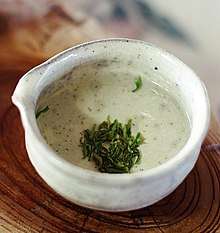Ujeon
Ujeon (우전; 雨前; lit. "pre-rain"), also called cheonmul-cha (첫물차; lit. "first flush tea"),[1] refers to nokcha (green tea) made of young, tender leaves and buds hand-plucked before gogu ("grain rain", 20–21 April).[2][3] The delicate tea has sweet, soft, and subtle flavor profile,[4] and is best steeped at a temperature of 50 °C (122 °F).[5]
 Ujeon green tea from Hadong County | |
| Type | Nokcha (green tea) |
|---|---|
| Country of origin | Korea |
| Ingredients | First-flush tea leaves |
| Korean name | |
| Hangul | 우전 |
|---|---|
| Hanja | 雨前 |
| Revised Romanization | ujeon |
| McCune–Reischauer | ujŏn |
| IPA | [u.dʑʌn] |
| Alternative name | |
| Hangul | 첫물차 |
| Hanja | --茶 |
| Revised Romanization | cheonmul-cha |
| McCune–Reischauer | ch'ŏnmul-ch'a |
| IPA | [tɕʰʌn.mul.tɕʰa] |
Korean ujeon is equivalent to Chinese mingqian ("pre-Qingming") and Japanese shincha ("new tea").[6]
References
- Brother Anthony of Taizé; Kyeong-hee, Hong (2007). The Korean Way of Tea: An Introductory Guide. Seoul: Seoul Selection. p. 13. ISBN 9788991913172.
- Richardson, Lisa Boalt (2016) [2014]. Modern Tea: A Fresh Look at an Ancient Beverage 차 상식사전 (in Korean). Translated by 공, 민희. Seoul: Gilbut Publishing. p. 51. ISBN 9791160500370.
- Jackson, Julie (14 June 2013). "Green as far as the eye can see". The Korea Herald. Retrieved 20 March 2017.
- Gaylard, Linda (2015). The Tea Book. New York: Dorling Kindersley. p. 110. ISBN 9781465436061.
- Kim, Young-mann, ed. (2004). "Tradition - The Way of Tea: A Lifestyle Aesthetic for Learning the Depth and Enlightenment of Life". Pictorial Korea. Korean Overseas Culture and Information Service. p. 26. OCLC 704162423.
- Heiss, Mary Lou; Heiss, Robert J. (2010). The Tea Enthusiast's Handbook: A Guide to Enjoying the World's Best Teas. New York: Ten Speed Press. p. 61. ISBN 9781580088046.
This article is issued from Wikipedia. The text is licensed under Creative Commons - Attribution - Sharealike. Additional terms may apply for the media files.